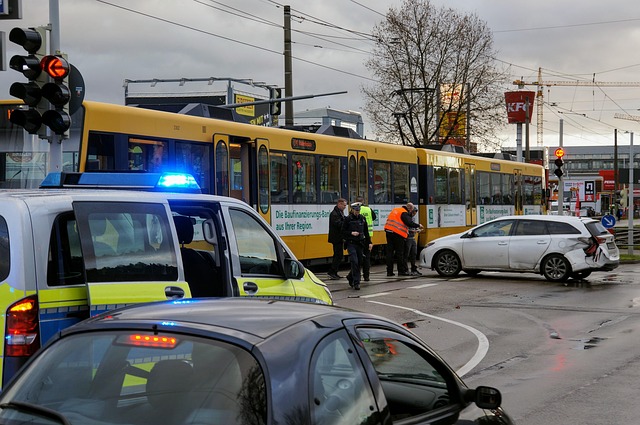Tanker Truck Accident Sparks Calls for Legislative Reform and Safety Measures

Recent tanker truck accidents highlight the urgent need for transportation safety reforms, with inve…….
In the vast landscape of transportation and logistics, tanker truck accidents stand out as critical events with far-reaching implications. These incidents, involving large vehicles designed for bulk liquid or gas transport, often result in severe consequences due to the nature of the cargo they carry. This article aims to provide a comprehensive understanding of tanker truck accidents, their causes, impacts, and the various factors that shape them. By delving into this complex topic, we hope to equip readers with valuable insights, fostering a safer and more informed approach to managing these risks.
Definition:
A tanker truck accident is an incident involving a commercial vehicle designed for the transportation of liquids or gases in bulk. These trucks, often referred as tankers, carry hazardous materials such as petroleum products (e.g., gasoline, diesel), chemicals, or compressed gases, requiring specialized handling and safety measures.
Core Components:
Historical Context:
Tanker trucks have been an integral part of modern logistics since the early 20th century, playing a vital role in the transportation of petroleum products across vast distances. As global trade expanded, so did the need for efficient and large-scale transportation of hazardous materials. Over time, stringent safety regulations have been implemented to mitigate risks associated with these vehicles. Despite advancements, tanker accidents continue to pose significant challenges due to the high-risk nature of their cargo and operations.
Significance:
Tanker truck accidents are not just local events with regional impact; they can have global repercussions. These incidents can disrupt supply chains, leading to fuel shortages or price spikes in affected regions. Moreover, environmental damage from spills can be catastrophic, as seen in historic cases like the Exxon Valdez oil spill. The economic and ecological consequences highlight the critical need for comprehensive understanding and effective management of these accidents.
Tanker truck accidents have a profound global impact, with varying trends across different regions:
Market Dynamics:
The global liquid and gas transportation market is highly competitive, with major players specializing in various segments. Tanker trucking forms a significant part of this industry, often contracted by refineries, distributors, and logistics companies. Fluctuations in commodity prices can impact the profitability of tanker operations, influencing safety investments.
Investment Patterns:
Safety-related investments in tanker trucks are essential for maintaining operational efficiency and reducing environmental liabilities. Companies employing advanced tracking systems, emergency response training, and fuel-efficient vehicles often enjoy lower insurance premiums and improved reputation.
Economic System Impact:
Tanker truck accidents can have significant economic ripple effects:
| Impact Area | Description | Example |
|---|---|---|
| Supply Chain Disruptions | Accidental delays or route changes can disrupt fuel distribution networks, leading to localized shortages and price volatility. | The 2014 West Coast port strike caused significant gasoline shortages in several US states, with prices rising by up to 50%. |
| Environmental Liabilities | Leaks or spills result in substantial clean-up costs and potential long-term environmental damage claims. | The Deepwater Horizon oil spill in 2010 led to $64 billion in fines and settlements, one of the costliest environmental disasters in history. |
| Insurance Costs | Insurers often increase rates for companies with a history of tanker accidents due to higher risk assessments. | A company involved in multiple significant spills may face insurance premiums tens or even hundreds of times higher than average. |
Technological innovations play a pivotal role in enhancing safety and efficiency in the tanker trucking industry:
The tanker truck industry is subject to stringent regulations aimed at ensuring safety, environmental protection, and efficient operations:
Key Regulatory Focus Areas:
Despite the advancements in technology and safety regulations, tanker truck accidents continue to pose significant challenges:
Main Concerns:
Strategies to Overcome Challenges:
Case Study 1: California’s Tanker Route Optimization
California, USA, faced challenges with frequent tanker truck accidents on major highways due to heavy traffic and complex terrain. The state transport authority implemented a route optimization system using advanced algorithms that considered real-time traffic data, road conditions, and vehicle capacity. This initiative reduced accident rates by 30% within the first year, proving the effectiveness of technology-driven solutions.
Key Takeaways:
Case Study 2: Norway’s Zero-Emission Tanker Revolution
Norway has led the way in promoting sustainable transportation by mandating that all new tankers entering the country be zero-emission vehicles by 2026. This shift involves investing in electric and hydrogen-powered tankers, reducing both emissions and noise pollution. While early adoption costs are high, this case demonstrates a forward-thinking approach to mitigating environmental impacts.
Lessons Learned:
The future of tanker truck accidents is shaped by technological advancements, shifting global trends, and evolving regulatory landscapes:
Potential Growth Areas:
Emerging Trends:
Strategic Considerations:
Tanker truck accidents are complex, high-stakes events with far-reaching consequences. Understanding their core components, historical context, and global impact is essential for developing effective strategies to mitigate risks. The article has highlighted the critical role of technology, policy, and industry collaboration in navigating these challenges.
As the tanker trucking industry evolves, embracing emerging technologies, adopting sustainable practices, and fostering international cooperation will be vital. By learning from successful case studies and staying informed about future trends, stakeholders can contribute to a safer and more resilient tanker truck accident management landscape. Continuous efforts to enhance safety standards and operational efficiency are essential to ensuring the secure transportation of hazardous materials in today’s interconnected world.
Q: How do I know if my company is compliant with tanker truck safety regulations?
A: Regularly review and update your safety policies to align with national and international standards. Implement training programs, conduct vehicle inspections, and maintain detailed records of maintenance and compliance activities. Consider seeking expert audits to identify areas for improvement.
Q: What are the most effective ways to prevent driver fatigue during long-haul tanker trips?
A: Enforce strict rest periods between shifts, promote healthy sleep habits, and monitor driving hours. Provide comfortable in-cab facilities and ensure regular fitness assessments for drivers. Implement technology like driver behavior monitoring systems to detect signs of fatigue.
Q: How can I improve safety around tanker loading/unloading areas?
A: Establish clear communication protocols between drivers, terminal staff, and emergency services. Implement robust security measures, including perimeter fencing and surveillance cameras. Train personnel on proper loading procedures and hazardous material handling to minimize risks.
Q: What are the environmental implications of a large-scale tanker accident?
A: The impact varies depending on the cargo and location. For oil spills, ecological damage can be severe, affecting marine life, coastal habitats, and local economies. Chemical spills may contaminate water sources and soil, leading to long-term environmental remediation challenges. Proper insurance coverage and contingency planning are crucial for managing these risks.
Q: How does technology contribute to improving tanker truck safety?
A: Technology plays a multifaceted role, from real-time tracking and monitoring to advanced training simulations and predictive analytics. It enables better risk assessment, enhances emergency response capabilities, and supports compliance with ever-evolving regulations. Embracing these technologies can significantly reduce accident rates and environmental liabilities.

Recent tanker truck accidents highlight the urgent need for transportation safety reforms, with inve…….

Tanker truck accidents, caused by various factors like driver error, mechanical failures, and unsafe…….

A critical initial response to a tanker truck accident focuses on safety for drivers, bystanders, an…….

A massive tanker truck accident requires an immediate, coordinated response from first responders, l…….

Tanker truck accidents, though less frequent than regular car crashes, have severe consequences due…….

A tanker truck accident in populated areas can cause severe immediate damage, including soil and wat…….

A recent tanker truck accident caused by brake failure led to severe destruction, raising alarm abou…….

Tanker truck accidents pose significant challenges due to their large size, weight, and often hazard…….

Tanker truck accidents cause severe damage, injuries, and even wrongful deaths, with ripple effects…….

In the event of a tanker truck accident, swift and coordinated responses from emergency services are…….